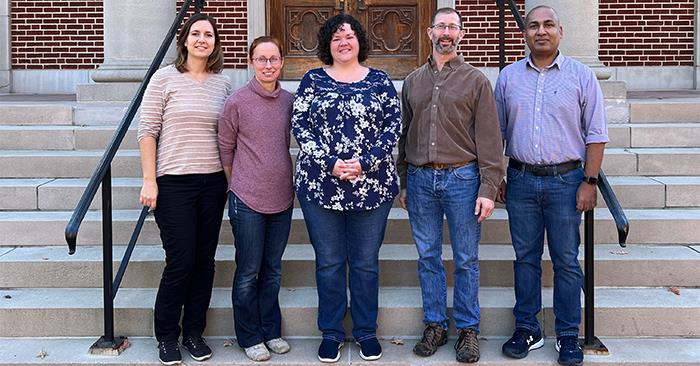Faculty Work on NSF Grant Leads to New Microscope for Truman

Faculty members (from left) Daniela Ostrowski, Joyce Patrick, Stephanie Maiden, Brett Berke and Hajee Mendis collaborated on a National Science Foundation grant that will allow Truman to purchase a fluorescent confocal microscope.
Truman recently secured funding for a fluorescent confocal microscope from the NSF through its Major Research Instrumentation program. This unique tool can remove out-of-focus light from regions of a sample and can detect light emitted from a protein or molecule. Many techniques in cell biology use fluorescent probes to visualize where specific proteins or processes are happening in a cell. Taken together, this new fluorescent confocal microscope will give users crisp, clear and detailed images of cell structure and function, which can help better understand animal development and even human disease.
A fluorescent confocal microscope is not something typically found at most undergraduate institutions. When interviewing for faculty positions in 2015, access to equipment like this was a high priority for Stephanie Maiden, associate professor of biology.
“It was one of the questions I asked – “does your department have a fluorescent confocal microscope?” – and the answer in all cases except Truman was no,” Maiden said. “Other colleagues I know at undergraduate-focused institutions either do not have one or use one at a nearby R01 school.”
Truman previously had an older version of a fluorescent confocal microscope, which was also made available through the Major Research Instrumentation program, but the technology aged and it was too costly to fix or replace its components. Also, it was more difficult to use, so it was not readily available to undergraduate students. This new model is more amenable to undergraduate use, which Maiden predicts should lead to more course-based research projects, as well as expanded opportunities in faculty members’ independent research labs.
“There are certainly projects I have placed on the back-burner because we didn’t have the equipment to proceed, or ideas I have had that were just not feasible given our equipment,” she said.
Maiden was one of five co-principal investigators who collaborated to secure funding. Brett Berke, associate professor of biology; Joyce Patrick, associate professor of biology; Hajee Mendis, assistant professor of biology; and Daniela Ostrowski, a former faculty member now with A.T. Still University, all played a role in securing the grant.
This was the fourth application submitted to receive the grant. Major Research Instrumentation grants are only accepted once a year, with funding decisions taking as long as six months. While multiple application attempts are not unusual, it can be a time-consuming process. Maiden was hoping to secure funding by second attempt. After years of applications, she was relieved upon learning it was finally approved.
“I was actually at the library with my daughter when the email came in and I audibly squealed for pure joy,” she said.
Maiden, Berke, Patrick, Mendis and Ostrowski are all currently pursuing research that will benefit immediately by having a new fluorescent confocal microscope. Additionally, the new equipment will create expanded research opportunities, as well as potential collaborative projects with ATSU.
With funding secured, Truman is scheduled to take possession of its new microscope in January.
